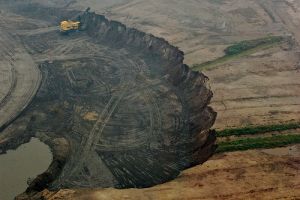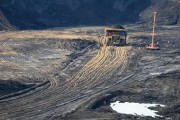After eight years of deliberation, Alberta has essentially handed industry a free pass when it comes to compensating for the loss of wetlands in the oilsands region. Given the pressure the government is under to show its environmental scruples these days, you’d think it would have seized this opportunity. Instead, the policy gave the oilsands industry at least a two-year exemption from taking any responsibility for wetlands.
Despite the significant land impacts associated with expansion of the oilsands, the policy does not extend to Alberta’s public lands until 2015 and exempts from its rules projects that are currently operating, approved and, most remarkably, those still seeking approval. Yet, with 195 oilsands projects underway or in the approval phase, mining and in situ operations are already causing significant loss and alteration of wetlands. In 2011 alone, approved oilsands mining projects were expected to result in the loss of approximately 28,000 hectares of peatlands.
Despite science-based thresholds and the known environmental and economic benefit that wetlands provide, oilsands projects will not be subject to any binding compensation measures when it comes to restoring and protecting Alberta’s wetlands for likely more than another decade.
 These exemptions come at a time when the recent Joint Review Panel decision report for the Shell Jackpine Mine Expansion project determined that the project would have significant adverse environmental effects on wetlands, wetland-reliant species at risk including migratory birds, and biodiversity. The panel’s report recommended that the wetland policy be implemented and mitigation required before any new provincial or federal approvals are issued.
These exemptions come at a time when the recent Joint Review Panel decision report for the Shell Jackpine Mine Expansion project determined that the project would have significant adverse environmental effects on wetlands, wetland-reliant species at risk including migratory birds, and biodiversity. The panel’s report recommended that the wetland policy be implemented and mitigation required before any new provincial or federal approvals are issued.
Tens of thousands of hectares of wetlands escape regulation
The mineable oilsands area is 4,750 square kilometres — 99 per cent of which is already under lease for oilsands mining activity, and up to 65 per cent of which consists of wetlands. Research conducted by Global Forest Watch Canada suggests that, in a full resource development scenario, mining and in situ developments combined could result in the loss of as much as 460,000 hectares of peatlands.
A 2008 report by the Alberta Water Council — the body delegated by the Government of Alberta to recommend a wetland policy for the province — recommended a “no-net-loss” policy on wetlands. A no-net-loss policy would require oilsands companies to create wetlands of equal value for every hectare destroyed by oilsands activities. Wetland policies that include the no-net-loss principle, or other credible means of compensating for land impacts, are critical management actions needed to prevent the permanent loss of wetlands.
Unfortunately, the government’s new policy abandons a past goal of no net loss in southern Alberta and allows for valuable wetlands in northeastern Alberta to be destroyed without compensation. In cases where wetland loss is inevitable, the new policy provides oilsands developers with two options: either compensate for wetland destruction by restoring or constructing a new wetland in the province, or pay a fee to support research, monitoring or public education instead of restoring the wetland. What’s worse, the policy’s valuation scheme may result in wetlands in the oilsands region being valued less than wetlands in other parts of the province. This could result in less stringent wetland replacement requirements for oilsands companies.
Pennywise and pound foolish

According to analysis from the University of Alberta, the average cost to compensate for one hectare of wetland destruction is $7,600. Pembina’s own research suggests that oilsands mines disturb an average of 9.4 hectares per million barrels of oil produced, meaning that if a mine was located in 100 per cent wetland habitat the cost of compensation would be merely seven cents per barrel.
Despite the small per barrel economic impacts to oilsands producers, the Canadian Association of Petroleum Producers has lobbied against implementing a strong wetlands policy. The Government has also said that it would be “too onerous” — and too costly — to require projects in the application stage to meet the new standard. However, claims that wetland replacement compensation costs are infeasible and cost prohibitive for the oilsands industry have never been substantiated, making this regulation holiday all the more curious.
A small number of leading oilsands companies, like Shell and Suncor, are already voluntarily conserving wetlands. But by listening to the lobbying of the lowest common denominator in the oilsands industry, the Alberta government has set the bar to the level of the worst performers, not the best.
Accountable to whom?
From both an environmental and economic perspective, the wetlands policy was an opportunity to improve environmental management in the oilsands sector at fair financial cost to industry while improving social licence to operate. Requiring oilsands developers to avoid and minimize impacts to wetlands and ensure no net loss of wetlands in Alberta is in the interest of current and future generations of Albertans. But, instead of creating a policy in the best interest of Albertans, the government appears to have again been swayed by excessive industry influence.
International examples of robust wetlands policy, such as the Western Australia Environmental Protection Authority’s position statement on “no net environmental loss” and the US Fish and Wildlife Service Wetlands Policy and Action Plan, indicates a growing trend of no-net-loss wetlands policies around the world. It’s time Alberta took a cue from real examples of environmental stewardship, instead of unveiling a disappointing policy most notable for its exemptions and loopholes.









